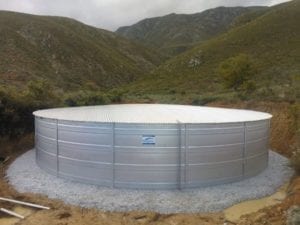The Western Cape Department of Agriculture, assisting the Genadendal Farmers’ Union under the 2008 Flood Relief Scheme, has installed two permanent water reservoirs near Voorstekraal, an Overberg village on the outskirts of Genadendal, to enable market gardening as a means of job creation.
During the last week of September, villagers helped install the two panel-type Rainbow reservoirs at a prepared site on a mountain slope overlooking the village. The reservoirs will supply water to community vegetable gardens, where crops will be commercially cultivated for sale at the fresh produce market held weekly in nearby Greyton. It is hoped that this project will encourage related village microenterprise through plans for a monthly market encompassing a broader range of local, organic products, including environmentally friendly cleaning products and cosmetics. In Voorstekraal, water has previously not been available in sufficient quantities for bulk irrigation of semi-commercial agricultural ventures. Reliant on a mountain stream some distance away for all water supplies, reticulated water for domestic consumption became available only in January 2011 when the Theewaterskloof Municipality built a weir to enable water to be tapped in sufficient volumes for purification and properly reticulated delivery to the village. For this potable water project, Rainbow Reservoirs installed an initial reservoir of 153 000 ℓ, fed by gravity from the weir.For the vegetable gardens, two reservoirs of 240 000 ℓ each – also gravity fed – have been installed.Although a single tank of larger capacity was considered, strict Overberg conservation laws dictated the installation of twin reservoirs with capacities below the legal limit.
The department selected Rainbow Reservoirs as the supplier for these reservoirs for reasons of product design. Besides robust construction and long life, the Rainbow reservoir requires no concrete base for capacities up to 400 000 ℓ, a sand foundation is used instead. This was an important consideration in the ecologically sensitive Overberg, where the municipality wanted to avoid heavy vehicles ploughing up muddy local tracks to deliver foundational concrete. It also meant that local labour could be used to help with reservoir construction. At the time that the Rainbow irrigation reservoirs were installed in late September, trench preparation for pipe laying was at an advanced stage. At the time of writing, the project was expected to be complete by November and preparatory garden cultivation is already under way.






